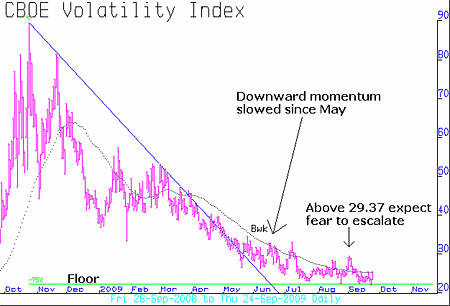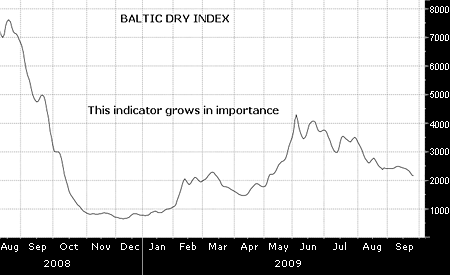Get the latest financial news, insights and expert analysis from our award-winning MoneyWeek team, to help you understand what really matters when it comes to your finances.
You are now subscribed
Your newsletter sign-up was successful
Want to add more newsletters?

Twice daily
MoneyWeek
Get the latest financial news, insights and expert analysis from our award-winning MoneyWeek team, to help you understand what really matters when it comes to your finances.

Four times a week
Look After My Bills
Sign up to our free money-saving newsletter, filled with the latest news and expert advice to help you find the best tips and deals for managing your bills. Start saving today!
Stock markets can't go up indefinitely, even new primary bull markets, which we don't think we are in. Certainly, the short-term stars are coming into alignment for at least a significant pull back if not a complete return to primary bear market status.
The unblinking belief that we are witnessing a "V" shaped recovery just doesn't ring true. If anything, as the Monetary Policy Committee said last week "The apparent recovery in the economy may be a false dawn". They went on to say that weak bank lending, high levels of debt and damaged bank balance sheets could lead to an economic relapse so do they think "W" shaped?
The scale of the stock market rally since March has been quite extraordinary; unquestionably, equity markets are now deep in overbought territory. In a recent article in the Financial Times, David Rosenberg of Gluskin Sheff & Associates Inc, said it all:
MoneyWeek
Subscribe to MoneyWeek today and get your first six magazine issues absolutely FREE

Sign up to Money Morning
Don't miss the latest investment and personal finances news, market analysis, plus money-saving tips with our free twice-daily newsletter
Don't miss the latest investment and personal finances news, market analysis, plus money-saving tips with our free twice-daily newsletter
"This market is now trading as if we were in the second half of a recovery phase, yet it has not been fully ascertained that the downturn is over." He went on to say: "An unprecedented eight-point price/earnings multiple expansion during a six-month faith-based rally has left the market at its most expensive (26 times operating profit, 180 times reported profit) in seven years. On a reported basis, this market is nearly four times overvalued, as it was during the tech bubble!"
We are also witnessing a surge in rights issues as companies recognise the unique opportunity to raise cash at a time when their share prices are in rarefied territory.

What we have called 'wrong notes' continue to twang! The VIX, known as the fear index, still consolidates at a relatively elevated level (see chart above); long-dated gilts continue to be in demand; gold touches $1,000/oz and the Baltic Dry Index continues to deteriorate (see chart below). The suggested reason for its decline is reduced demand by China for commodities. If that is true, it is a key message for the global economy and for future asset prices. So far, since June, the Baltic Dry has fallen almost 50%. The number of ships outside Chinese ports waiting to unload, which peaked in June at 88, is down to 20 and the waiting time to unload has fallen from 18 to three days.

The G-20 meeting last March, hosted by Gordon Brown, confirmed that the rich nations were set on ensuring that their economies held up, and to do so pledged as much money as was necessary. In fairness, they have been as good as their word; trillions of dollars of stimuli have given rise to extreme optimism and buoyant stock markets. In spite of this, the question that has to be asked is: "Is the economy improving?" To which the answer is: "No, at best it is getting worse, slower".
We suspect that this coming period, starting with another G-20 meeting, has the potential to frighten markets on the realisation that the stimulus packages have to end. Action intimated by central banks around the world, no matter how subtle, could cause stock markets to plunge. In due course we expect them to test their March 2009 lows. Once the weaknesses start to show, selling will accelerate, leading to a rush for the exits.
Much of the second-quarter "better than expected" corporate profits originated from plain and simple retrenchment; companies improved their profits by cutting their costs. These cuts were other companies' lost income.
Likewise, culling staff is negative for consumer spending and bad for other companies' revenue. Unless businesses hire and invest, future earnings will disappoint. The FT on 18 September said that "Foreign direct investment (FDI) is likely to fall around the world this year as global financial pressure causes companies to draw in their horns. The UN Conference on Trade and Development, the single most comprehensive source of FDI data, said that cross border investment, which dropped sharply last year, would probably slide from $1,700 billion in 2008 to less than $1,200 billion this year." In other words, another $500 billion less revenue for the world's companies; retrenchment is truly a global phenomenon.
A further clear signal that points to a potential turning point is the news of a surge in trading by small investors; apparently it has reached levels not seen since the dotcom boom. According to some of the country's biggest brokers, a tide of individual investors frustrated with the low interest rates on offer in cash savings accounts have turned to equities in the hope of riding a six-month rally a classic signal of a top!
Our portfolio is poised to benefit very considerably on FTSE weakness and gilt strength, both of which we believe are now very likely.
This article was written by Full Circle Asset Management, and was published in the threesixty Newsletter on 25 September 2009
Get the latest financial news, insights and expert analysis from our award-winning MoneyWeek team, to help you understand what really matters when it comes to your finances.
MoneyWeek is written by a team of experienced and award-winning journalists, plus expert columnists. As well as daily digital news and features, MoneyWeek also publishes a weekly magazine, covering investing and personal finance. From share tips, pensions, gold to practical investment tips - we provide a round-up to help you make money and keep it.
-
 Inheritance tax investigations net HMRC an extra £246m from bereaved families
Inheritance tax investigations net HMRC an extra £246m from bereaved familiesHMRC embarked on almost 4,000 probes into unpaid inheritance tax in the year to last April, new figures show, in an increasingly tough crackdown on families it thinks have tried to evade their full bill
-
 Average UK house price reaches £300,000 for first time, Halifax says
Average UK house price reaches £300,000 for first time, Halifax saysWhile the average house price has topped £300k, regional disparities still remain, Halifax finds.

